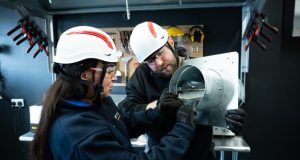UK office cleaning company SMC Premier surveyed over 5,000 UK office workers about their hygiene habits at work.
The results revealed a disturbing statistic that only 61 per cent of respondents wash their hands properly with warm water and soap after going to the toilet. Eighteen per cent will do a quick hand wash, 14 per cent occasionally wash their hands, and a disgusting 7 per cent admitted to not washing their hands.
Survey data also uncovered that women are more hygienic than men after using the toilet with 66 per cent happily washing their hands after a visit to the bathroom, compared to 53 per cent of men.
When comparing the age groups, 11 per cent of the younger generation (18-24-year olds) confessed to not washing their hands after the toilet, making this statistic above the overall average of 7 per cent.
Seventy-seven per cent of respondents shared the same thought that our beloved four-legged friend is highly unhygienic to have in the office. This statistic was significantly higher amongst the over 65’s with 85 per cent.
Two per cent of employees with a dog in the office have considered leaving their job to be in a dog-free environment.
Eating at your desk isn’t uncommon especially for 26 per cent of office workers who remain at their desk to eat at least 1-3 times per week. A quarter of respondents admitted to eating and working 3-5 days per week, and 4 per cent having no choice but to eat at their desk every day. But is 4 per cent a high statistic? Are employees expected to work through lunches to meet work deadlines?
On average, around half of 18-64-year olds will move away from their desk to eat, leaving the other half to remain seated occasionally.
Despite the popularity of eating at your desk, only 11 per cent of workers will clean theirs properly. Thirty-eight per cent will do a ‘quick clean’ – put snack wrappers in the bin or empty the crumbs from their keyboard, while 45 per cent are spotless eaters and never need to clean up after. However, there is still 7 per cent of employees who are too lazy to clean and instead leave it to someone to else.
The over 65’s is cautious about making a mess after eating at their desk with 72 per cent claiming that they don’t need to clean up, compared to just a third of Millennials.
The survey exposed people’s opinions around hot-desking, and a shocking 6 per cent of those asked were under the impression that all shared desks were cleaned after use. Twelve per cent of respondents who regularly hot desk will only work on the desk if they know it’s been cleaned first. Thirty-eight per cent share a strong opinion that communal desks are germ-infested because you never know who’s been sat there.
When it comes to who is responsible for the cleanliness of the office, 6 per cent revealed that it should be left to the cleaner as it’s not their problem. For 56 per cent of respondents, they admitted to helping clean up as it would eventually annoy them, and 38 per cent confessed that they reluctantly clean if they had to.
Have you thought about the cleanliness of your cup when drinking a brew out of it? We asked employees to share their brew making hygiene skills; 25 per cent confessed to never cleaning the cups before making a round. However, 39 per cent will wash the mugs properly, and 36 per cent will do a quick rinse to avoid using a communal sponge.
Is it culturally acceptable nowadays to leave the office cleaning to the cleaner to do, or have they become too lazy to do simple tasks such as washing your hands after the toilet, or spending a few seconds of your time to put a crisp packet in the bin? Or are employees too busy and expected to remain at their desk to work, thus, sacrificing lunch hours?
You can find the full survey results here: https://smcpremier.co.uk/office-habits-the-dirty-truth/ as well as a reference to office workplace studies.





